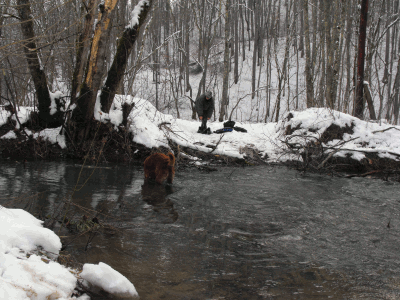
Emergency power outage infrastructure
 Someday, we'd like to be off the grid by
choice, so we've considered this extended (and still ongoing) power
outage as a useful dry run. It's been very helpful in giving us
an idea of infrastructure we need to be adding to the farm, and
reminding us which aspects of our electrified lives are really just
optional.
Someday, we'd like to be off the grid by
choice, so we've considered this extended (and still ongoing) power
outage as a useful dry run. It's been very helpful in giving us
an idea of infrastructure we need to be adding to the farm, and
reminding us which aspects of our electrified lives are really just
optional.
Here are the top
electricity-free items we've added to our wish list for next
year. Some are to buy, but a lot can probably be made from the
parts at hand.
- DC fan to keep the wood stove blowing hot air while the
generator's off. (Daddy suggested that we look into the fans that
cool off car engines --- we might be able to get one cheap at a
junkyard.)
- Alternator setup to get juice out of the golf cart so that we can run low electricity items (like the fan and maybe a router!) for much longer periods.
- Solar charger for the golf cart so that we can fill the golf cart batteries back up.
- Rocket stove (which we might be able to build) and a real Dutch oven for easy cooking.
- A second sub-zero sleeping bag so that we can both stay toasty during short-term emergencies.
- Solar LED lighting. You'd be amazed at what a difference it
makes to have enough light to read by on long, dark, electricity-free
nights. Flashlights have served us well, but we'd really like to
take some of those solar yard lights you can get so cheaply in the big
box stores nowadays and turn them into indoors lighting with the solar
panel outdoors for charging. Even though our current bulbs are
CFLs, I suspect that this would lower our electric bill during our
on-the-grid times too.
I also need to remember
to keep more library books on hand --- I'm starting to run a bit low,
which is a pain since the creek has flooded as the snow starts to melt
so I can't get to the library. We would have had a much easier
time with water, too, if we'd had the water line completely buried and
the big tank all the way full. Still, all told, I think we've
done pretty well so far.
When Mark mailed our
week's chicken waterers (made without the benefit of
electricity) this week, he overheard a lady in the post office
complaining about how difficult the power outage was since she couldn't
do her dishes. I feel so lucky that Mark's ingenuity has enabled
us to want for very little during this power outage!
This post is part of our Two Weeks Without Electricity series.
Read all of the entries:
|
Want more in-depth information? Browse through our books.
Or explore more posts by date or by subject.
About us: Anna Hess and Mark Hamilton spent over a decade living self-sufficiently in the mountains of Virginia before moving north to start over from scratch in the foothills of Ohio. They've experimented with permaculture, no-till gardening, trailersteading, home-based microbusinesses and much more, writing about their adventures in both blogs and books.
Want to be notified when new comments are posted on this page? Click on the RSS button after you add a comment to subscribe to the comment feed, or simply check the box beside "email replies to me" while writing your comment.

For DC lighting (like LEDs) you'll find that they don't like really long cords. With low voltage, the loss goes up per foot of wiring. This is the same reason that the electric lines run at thousands of volts and only at the home is it converted to 120 volts. So, if you do low voltage LEDs, you'll want to keep the lines as short as possible to the power source (battery, etc.) and again as short as possible to whatever is used to charge the power source (solar cells, wind power, etc.). There are online tools to calculate voltage drop through various size conductors and lengths. Here is one google turned up: http://nooutage.com/vdrop.htm
Also, for your creek, have y'all considered installing a zip line and maybe some sort of carriage? I'd think for a relatively small investment, you could install a cable between two trees and a carriage on a pulley which would keep you high and dry without the waders? Maybe that is a job for me if I ever make it out there...
That's really good advice about the solar --- thank you! That should help Mark's experiments aim in the right direction.
We'd actually just been talking about a zipline. We'd been thinking about it for a while, but neither of us know enough about it to feel comfortable buying the supplies. Do you have any advice on hardware? Now we want you to come tomorrow!